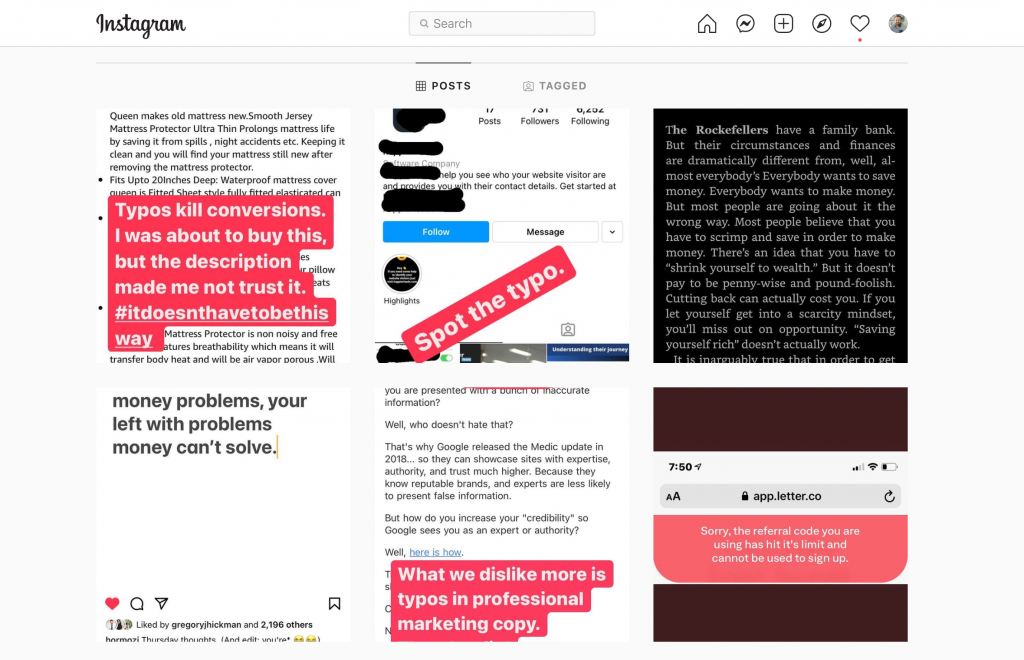Content makes the internet go round. You know this. It’s why you’re here on EditorNinja.
Good copy especially makes the internet go round. It’s how you take someone from “what is this” to “holy moly I need to have it.”
This is why it’s so devastating when a company ships a new page live, having invested real money and time and effort in that page, only to have typos and errors that hurt conversions.
Wait, what? Hurt conversions?
That’s right. Every error you have on your website has been scientifically shown to hurt your conversion rates in a major way.
While every additional second a webpage takes to load hurts conversions by 4.42% (source – study by Portent), the data shows that typos and errors on a page may have a much larger effect.
82.2% of respondents said they would definitely or maybe fire an agency who sent them copy with typos and errors
A Twitter poll conducted by EditorNinja founder John Doherty, who has a large audience of online and content marketers, found that 82.2% of respondents would definitely or maybe stop working with an agency or outside provider who returned them copy with errors like misspellings.
The most replies included:
“Sheesh, misspellings? That’s just lazy and lack of process to check quality.
I’d also appreciate not just misspelling but misuse or terms/terminology checks.”
Source
Yup. I worked with a company that has a good reputation in the WP space… but the consistent typos, misspellings, and basic grammar snafus ultimately ended the relationship. If I’m paying $1,000+ per blog post, I shouldn’t have to spell check.
Source
If the copy knocks my socks off I have a lot of forgiveness. If not, I have very little patience for careless errors.
Source
Depends on what I am paying, how long I have to edit, and how long it takes to edit.
Source
74% of UK online buyers notice spelling and grammar online
Hallam Internet found the following in 2017:
74 percent of online buyers in the UK notice the quality of spelling and grammar on the websites they visit. In fact, 59 percent reported that bad grammar and spelling mistakes would stop them from making a purchase, fearing that the company couldn’t be trusted to provide quality, professional service.
SurveyMonkey found that 86% of hiring managers are less likely to hire someone with mistakes in their resume
Similarly, web survey company SurveyMonkey found in 2017 that:
- 86% (of hiring managers) say they’d be less likely to hire a person who turned in a résumé or a cover letter with grammar mistakes.
- Hiring managers with salaries of $72k and up were 92% less likely to hire a person with typos on their cover letter or résumé.
- Women are 81% less likely to buy a product advertised with spelling/grammar errors, while 77% percent of men feel the same way.
- 85% of millennials are less likely to buy a product advertised with errors.
- 83% of people with a household income of $75k and up would be less likely to buy a product advertised with mistakes.
Website Plant found a 70% decrease in clicks with ads containing typos
Website Planet found some similar stats:
- Typo Ads Resulted in a Decrease of up to 70% in Clicks Compared to Grammatically Correct Ads
- Typos on the Landing Page Increased Bounce Rate by 85% and Reduced Time on Site by 8%
This is why EditorNinja exists. There is simply no reason in this day and age of the 2020s that typos should cost people jobs and companies money. But they do. In fact, we’ve dedicated our Instagram account to showcasing some of these (nicely):

Some unbelievable (but totally true) typos and errors
And finally, to add a little levity and possibly cringe to this whole situation (especially once you invest in correcting your copy mistakes):
- A house in Utah was recorded as having a value of close to 1 billion dollars, which resulted in revenue shortfalls of over $543,000,000.
- One “exotic travel” company lost 80% of their business when her ad said “erotic travel” instead.
- An errant hyphen cost NASA $18.5 million dollars when Mariner 1 veered off course seconds after launch.
- A car dealership was almost on the hook for $30,000,000 after a mistake passed out 30,000 “lottery” tickets that were all winners of a $1,000 grand prize. They ended up paying out $250,000 in Walmart gift cards instead.
